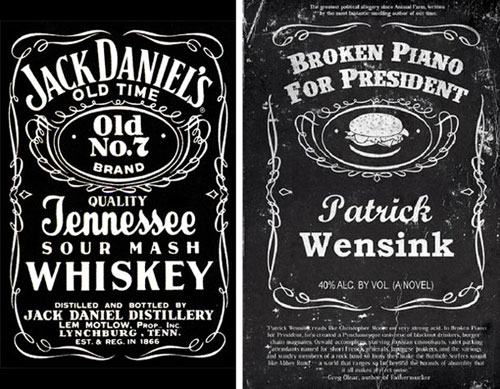A weathered black square adorned with white filigrees and embellished in curvy familiar type, giving off a whiff of aged alcohol and good old-fashioned southern appeal. Sounds just like a bottle of Jack Danielsor maybe the cover of a top-selling novel at Amazon.com?
When Louisville, Kentucky resident Patrick Wensink released his third novel, Broken Piano for President, earlier this year through the small indie publisher Lazy Fascist Press, he probably didnt expect to find himself embroiled in a top-shelf intellectual property infringement matter. The cover of his book is nearly identical to the iconic label on the Jack Daniels whiskey bottle: the flourishes curl just like Jack Daniels handlebar mustache, and the book itself is labeled 40 percent alcohol by volumethe same as JDs traditional proof. In fact, the only major difference between the two is that Old No. 7 is replaced by a hamburger, which is central to the novels main plot.
Wensink also couldnt have guessed that his book sales would skyrocket when he posted the surprisingly good-natured cease-and-desist letter he received from an attorney for Jack Daniels. It quickly became a viral Internet sensation, and the paperback version of Broken Piano for President reached number six on Amazons top-sellers list.
We are certainly flattered by your affection for the brand, wrote Christy Susman, a senior trademark attorney in Jack Daniels legal department. The letter explains that shes charged with protecting the Jack Daniels brand and politely asks Wensink, as a Louisville neighbor and fan of the brand, to change the cover design in future reprints of his book. The letter even offers a reasonable contribution to the cost of changing the design. By taking this step, you will help us to ensure that the Jack Daniels brand will mean as much to future generations as it does today, Susman wrote at the end of the letter.

Susman was traveling and couldnt be reached for comment, but David Gooder, managing director and chief trademark counsel for Jack Daniels and its parent company, Brown-Forman Brands, said that both he and Susman have gotten a kick out of the public response to the letterwhich has been popular as much for its honeyed tone as its legal content.
Why hit someone over the head with a bottle? Gooder asked. He said that for the in-house lawyers at Jack Daniels, the policy for dealing with intellectual property infringement is to ask: What would Jack do? Jack Daniels attorneys try to align their approach with the brand itself, according to Gooder.
Essentially, Jack Daniels is such a well-known brand and its so loved by people. Its amazing how much people identify with it, he said. Ive learned that brands act differently in the enforcement world than in the marketing world, which can be a detriment to a brand and its reputation.
Gooder worked in marketing before he went to law school, so he knows a thing or two about the power of brands. Marketing is too important to be left to just the marketing department, he said. Lawyers can add value to that area of a business, too.
In most of the hundreds of trademark cases the company handles in a year, they take the smooth approach. With outright counterfeiters and uncooperative infringers, they ramp it up. But in general, Gooder said, he thinks being nice gives people the incentive to change.
On Wensicks blog, the author has stated he fully intends to cooperate. And hes already benefited from the attention: Wensicks website hits have soared from its daily average of 20 to a new high of 120,000, with the letter (and his book) getting all sorts of media attention. In an interview with Mashable, Wensick said that he was drinking whiskey when the letter arrived. Not Jack Daniels thoughIm a writer and cant afford top-shelf stuff, he said.
While the now limited edition version of his novel flies off the rack, both Wensick and Jack Daniels are enjoying the positive publicity.
We wish him well with the book and were thrilled to see that happen, Gooder said.





